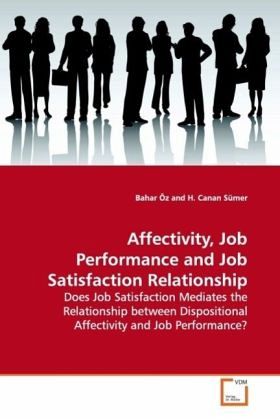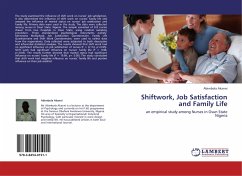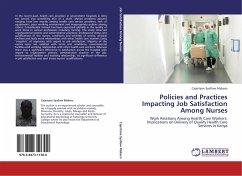
Affectivity, Job Performance and Job Satisfaction Relationship
Does Job Satisfaction Mediates the Relationship between Dispositional Affectivity and Job Performance?
Versandkostenfrei!
Versandfertig in 6-10 Tagen
32,99 €
inkl. MwSt.

PAYBACK Punkte
16 °P sammeln!
This book is about a study exploring the relationship between dispositional affectivity and job performance under the potential mediating effects of job satisfaction. The study was conducted in three phases. In Phase I, the scale development phase, a teaching assistant evaluation form (AEF) was developed by collecting job analytic information from teaching assistants (TAs) and critical incidents from faculty members. In the second phase of the study, the pilot study, factor structure of the AEF was examined using principle component analyses. Results yielded two factors underlying the AEF. The...
This book is about a study exploring the
relationship between dispositional affectivity and
job performance under the potential mediating
effects of job satisfaction. The study was conducted
in three phases. In Phase I, the scale development
phase, a teaching assistant evaluation form (AEF)
was developed by collecting job analytic information
from teaching assistants (TAs) and critical
incidents from faculty members. In the second phase
of the study, the pilot study, factor structure of
the AEF was examined using principle component
analyses. Results yielded two factors underlying the
AEF. The first factor was named task performance;
the second factor was named contextual performance.
In the third phase, the main study, hypotheses were
tested by gathering dispositional affectivity and
job satisfaction data from TAs, and performance
evaluation data from the instructors whom the TAs
had worked with during the previous semester.
Results indicated that positive affectivity (PA)
predicted job satisfaction; and both PA and job
satisfaction seemed to have suppressed each other in
their relationships with contextual performance.
relationship between dispositional affectivity and
job performance under the potential mediating
effects of job satisfaction. The study was conducted
in three phases. In Phase I, the scale development
phase, a teaching assistant evaluation form (AEF)
was developed by collecting job analytic information
from teaching assistants (TAs) and critical
incidents from faculty members. In the second phase
of the study, the pilot study, factor structure of
the AEF was examined using principle component
analyses. Results yielded two factors underlying the
AEF. The first factor was named task performance;
the second factor was named contextual performance.
In the third phase, the main study, hypotheses were
tested by gathering dispositional affectivity and
job satisfaction data from TAs, and performance
evaluation data from the instructors whom the TAs
had worked with during the previous semester.
Results indicated that positive affectivity (PA)
predicted job satisfaction; and both PA and job
satisfaction seemed to have suppressed each other in
their relationships with contextual performance.












